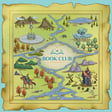Become a Creator today!Start creating today - Share your story with the world!
Start for free
00:00:00
00:00:01

A Psalm for the Wild-Built by Becky Chambers Book Club
This novella seamlessly weaves philosophical questions about humanity’s place in the greater ecosystem within a delightful story about a monk and a robot. Caroline and Carly talk about shame as a prosocial instinct and whether or not the effect of shame changes when a society is healthy or unhealthy.
You can get your copy of the books using our affiliate links here:
Complete our feedback form and suggest books to read for future seasons.
Transcript
Introduction and Podcast Updates
00:00:00
Speaker
Hello listeners. Welcome to season two of the book club podcast.
Book Discussion: 'A Psalm for the Wild Built' Overview
00:00:03
Speaker
We now have a sub stack subscribe at book club, pod.substack.com to be the first to know about our next season and read our posts about books and podcasts. We listened to between seasons. Also, we will be spoiling a song for the wild build and any other books were written this season.
First Impressions and Setting Description
00:00:19
Speaker
Everybody thinks they're the exception to the rule. And that's exactly where the trouble starts.
00:00:24
Speaker
one person can do a lot of damage. Today we are discussing a Psalm for the Wild built by Becky Chambers. I'm Carly and I really enjoy this story and the world that Chambers has created. I'm Caroline and I felt similarly this was just such a simple feel-good novel in a lot of ways.
00:00:42
Speaker
So the story takes place on another world called Penga. Its one continent was split in half, one half for wilderness and the other half for human civilization. Centuries before the story begins, all the robots suddenly gained sentience and walked away from human society into the wilderness.
Character Journey: Sibling Dex's Path
00:00:59
Speaker
Humans and robots have had no contact since.
00:01:01
Speaker
The main character is sibling Dex, a monk. Dex has no gender so we will use they-them pronoun. This world has a religion honoring six gods, a religion that the robots follow as well. Dex decides to leave the monastery one day to become a tea monk, traveling to different towns in a personalized wagon pulled by a bicycle, growing and cultivating teas and herbs to give out to people who need a chance to rest and talk about their problems.
00:01:26
Speaker
Dex chooses to do this without any formal training, so they learn from experience how to provide a comfortable sitting area and mix different herbs for different ailments.
Meeting Mosscap and Robot Society Insights
00:01:34
Speaker
After three years, Dex has become the best tea monk but feels some dissatisfaction with life, so they decide to ride into the wilderness. On their first night camping in the wilderness, a robot named Mosscap finds them.
00:01:47
Speaker
Moscap volunteered during a council of robots to go and study how human society has progressed since the robots left. It explains to Dex how the robots decided to make new robots from old parts instead of indefinitely repairing old robots. When a new robot is built, it is named after the first thing it notices. So Moscap is named after mushrooms, a certain type of mushroom called a Moscap, apparently.
00:02:13
Speaker
These next generation robots that were not built in factories are called wild built.
Themes of Belief and Purpose
00:02:19
Speaker
Moscap agrees to escort Dex to an ancient abandoned hermitage and asks that they guide it through human civilization afterward. Dex agrees but does not really like the idea of being a guide.
00:02:31
Speaker
Moscap explains to Dex that the robots worship the same gods as the humans and they chose mortality because they wanted to be more like organisms than immortal machines. Many robots spend their time studying natural phenomena. Dex explains certain mores that humans developed after the robots left.
00:02:48
Speaker
for example, a strong moral sense against treating things as disposable and against trampling wild growing plants. Dex is forced to their physical and psychological limits when the road ends and they have to continue on foot. They spend the night in a cave and confront the difference between a human-made structure and shelter. They find the hermitage and find a living space that represents Alaleh, the summer bear, and the god of Dex's monastic order.
00:03:14
Speaker
They find an old tea mug, and that triggers Dex's memory of their first visit to a monastery of Allalay on a rough day when they were 10 years old. That was when they had their first tea service, and when Dex decided to become a monk. Dex realizes that the purpose they sought is no longer satisfying. Dex falls asleep, and when they wake up, MOSCAP has prepared a tea service for them.
Human-Nature Relationships and Societal Reflection
00:03:36
Speaker
Okay, so the ending is so abstract, I guess I'll say, but we can talk about that later. I think the good starting point is because Moscap and Dex have a lot of conversations about what is natural studying nature, the wilderness, the imposition of nature, and Dex has these beliefs clearly from their religion and the culture, and Moscap challenges them.
00:04:02
Speaker
I think the question is, at which point do humans leave their natural ecosystem, if ever? And we see this reflected with the robot society. The robots chose to be part of natural cycles, and do humans have that same choice?
00:04:18
Speaker
Because it seemed that the story was making these parallels between the choices that the robots make on how they spend their time to be wild built, to be mortal, and the way Dex has a choice in their participation in life and the ecosystem.
Exploration of Civilization and Nature Balance
00:04:38
Speaker
Yes i really like this question i want to provide a little more context which is that the world that decks lives in the humans have decided to occupy and live in a very small percentage of this planet i think it's something like ten percent i don't remember the exact number but they have chosen to have dense
00:04:58
Speaker
settlements and leave a large portion of the world in its natural wild state. The human civilizations also have a lot of rules about how to preserve it. At one point, Dex fills a lot of guilt for stepping off path and that's where the quote that I mentioned at the top, you know, one person can cause a lot of damage. That's where it comes up. So they have all these rules about how to preserve and protect nature and wilderness and they clearly
00:05:27
Speaker
value nature, but then, you know, as Carly said, when Dex and Moscap start conversing, there are a lot of ways in which Dex realizes that they and his, the human society in general, however much they value nature, they're pretty separate from it in many ways.
00:05:45
Speaker
Well, I think there's a confrontation too. Well, maybe several sub-confrontations when Dex first leaves the border and there's an old road. So I'd get confused when they talk about the humans left this part for wilderness. Where Dex travels, humans have been there before. It's just been many centuries and it was before the robots woke up and they call that the factory age when people were making a lot of things in factories out of non-renewable resources.
00:06:13
Speaker
And so there was a split that happened and it was unclear to me like at what point they set the wilderness aside like was there wilderness set aside that's kind of it's described as pristine and it's described as untouched by humans but then Dex goes into the wilderness and there's a road and they're going to an old abandoned hermitage and there was they find a factory.
00:06:32
Speaker
So it's like, okay, it's not pristine. Humans were here at one point. And Dex takes a lot of comfort in that. When they're staying in the cave, Dex is like, it's not warm. It's still a wild place. And it's unsettling. And Moscow offers some like comfort to Dex.
00:06:47
Speaker
there to sort of add some, make Dex feel secure there in the cave. And then there's a huge difference when they get to the abandoned hermitage, which was the goal. Dex feels so much more comforted, even finding a sign that is damaged by years of abandonment is so comforted knowing that humans have been here before. So
00:07:04
Speaker
Yeah, Dex has to look at that like they live their life believing that they're honoring the natural cycles. But leaving civilization is still a big reckoning, you know, and there's like these instincts that Dex has to feel to be like, Oh, a funny example, maybe this will help us understand this. So Dex's order is represented by a bear.
00:07:26
Speaker
Yeah, this is great. The cart has a lot of bear images. I think they wear a necklace or a pendant or something that's of the bear. And the bear represents comfort when Dex first night out of outside of civilization and a bear comes. Dex has just met Moscalf the Robot and it's kind of shocked to meet a robot. And then this bear, like a real live bear comes sniffing Dex's dinner that was cooking. And Dex is like,
00:07:53
Speaker
terrified for good reason.
Robots vs. Humans: Ecological Perspectives
00:07:56
Speaker
Like, they know that the bear could really tear up the trailer and then Dex won't have any food or clean water or anything. And Dex is terrified of this bear and like has to run and like close the door of the trailer. And I think that was a funny way to show like, here's a civilized image of a bear that symbolizes something. And then there's the real bear.
00:08:17
Speaker
I think it's particularly interesting because so much of these solar punk books really venerate nature, right? That's part of what's very appealing about them. But this book has a little thread that says, no matter how much humans choose to venerate and respect nature, they are separate in some really fundamental ways.
00:08:36
Speaker
There's a good argument here that the robots are more natural or wild than the humans here. First of all, because they live out in the wilderness and a lot of them devote their lives to just observing and appreciating nature. There's some funny characters that Moscap mentions, robots who spend 150 years just watching a stalactite grow one centimeter, right? Or
00:09:00
Speaker
watching a certain species of fish spawn over and over and you hear that and I mean they don't use these terms but what could be a deeper more religious meditation on nature than that? Right but it strikes me the reason that they can be in the wilderness is because they aren't part of it. They aren't part of the food chain.
00:09:20
Speaker
So they can't observe living things. The next piece of that opening quote, you know, Dex says one person can do a lot of damage. And Moscow says every living thing causes damage to others. You'd all starve otherwise, you know, like we can't not be part of the food chain. And so we can't just observe.
00:09:39
Speaker
And we can't seamlessly participate in the wilderness because our very presence requires that we drink water and step on grass and have to eat and pee. So like we can't have a shelter and all sorts of things that are really disruptive.
00:09:59
Speaker
It's funny, at the beginning of the book, I was thinking about the story of Yellowstone and how the wolf population had been decimated in Yellowstone. In one study, it took many decades for scientists to realize what was going on.
00:10:16
Speaker
The grasses, the natural grasses in Yellowstone were also decimated because the deer population was too big because there weren't wolves keeping down the deer population. So grass couldn't grow and because grass couldn't grow, especially along the rivers where the other animals sought water and food and all that.
00:10:35
Speaker
that cut down the small rodent population and birds and all these huge effects. And so when wolves were reintroduced to Yellowstone, then you saw all this other flourishing and diversity, you know, because the deer population was down. And yes, that's not great for the deer. And then Moscap retells the story later on in the book. I was like, oh, there's my Yellowstone story. OK, great. I thought that was a really clever way to include that in the story, that Moscap tells the story of saying wild dogs and elk, but it's basically the Yellowstone story.
00:11:05
Speaker
and talks about fear being a controlling factor, that humans wanted to be safe from wolves so that they could go hike and camp in Yellowstone and enjoy Yellowstone. And so they removed the wolves, but then that turned out to be a really bad decision. So the wolves are reintroduced, so the humans have to contend with that. They have to recognize that there's more danger and that's okay, that there's a fear that keeps things in check and that that's okay.
00:11:33
Speaker
Also interesting that seems like the solution here, if you really want a diverse and beautiful world is you just have to live with the fear of a wolf, right? Sure. Humans are just going to have to live with that fear a little bit in some areas, right? I mean, we're not talking about wolves stalking downtown streets or anything, but I think that's really hard to do to just accept that level of danger.
00:11:58
Speaker
Yes, that there's, well, it seems like there's an incompatibility between civilization and wilderness. I feel like that's an obvious point. But I mean, he talks about that when he talks when he's staying in the cave, right, which is technically shelter from the wind and rain, but it does not feel like shelter in a deeper, more emotional way. It is not a house or a home.
00:12:23
Speaker
and you know Dex who has been proud of their ability to survive and be flexible and be you know somewhat indifferent to normal creature comforts rather it's a learning experience for them right to realize that deep down they really want these civilizational comforts not even creature comforts he's not complaining about the hard floor or anything sorry they just feel
00:12:48
Speaker
Yeah. And it's that level that just like low level of unsafeness that humans have to deal with to not basically kill the entire ecosystem. Right. Well, and so that's an that's a choice. Right. That's an interesting choice of.
00:13:06
Speaker
humans have that choice. I don't think most animals do. I think part of the point of the story about the wild dogs and the elk is that the elk were perfectly happy eating all of the grass, right? It's not that things are better for the elk now that the wolves are back. It's that the elk had to sort of be fit back into their proper place in the cycle.
00:13:29
Speaker
Right. But if you told the story from the elk's point of view, it was better when there are no wolves. If you told the story, you know, from the wolves point of view, it was better when there are no hunters. Right. And I think that's part of the problem humans frame things or want to frame things in
00:13:46
Speaker
emotionally compelling narratives that feature a central character. But here we're talking about an overall ecosystem and how it functions. And you used the word abstract earlier, and that's pretty abstract. It's kind of hard to have a strong feeling about that.
00:14:01
Speaker
Right, the balance of all of these many different things and creatures pursuing their own goals and then creating this larger whole. Which reminds me of the gods, right? I think that the religion is really trying to instill that in people. There are six gods and parent gods. And the god who's always mentioned first is Bosch, god of the cycle. And I think that's what we're talking about. We're talking about a cycle.
00:14:31
Speaker
And it's interesting that this human society has made that one of their top values as a natural law, that there has to be cycles. Right. Yeah, these gods are interesting. So there's three parent gods.
00:14:47
Speaker
you know, somewhat superior form of gods, and they represent the cycle, the inanimate, and threads, like sewing threads, which that is an extraordinarily abstract list of values, right?
00:15:03
Speaker
But then in contrast, the child gods are much more definite, right? One of them is represented by a sunjay and a library. Another is the sugar bee and a third is the bear. And these all represent things like libraries, workshops, and cozy living spaces. So I think right there in the example of the gods, you have both, you know, on one hand,
00:15:28
Speaker
the really abstract, higher level thinking about cycles, the inanimate threads that connect us all. But then you get your very concrete and comforting things like the Sanjay, the bee, the bear. And I think there's something in that balance about how people would have to live were they to seek a society that was more environmentally responsible.
Religion and Societal Values
00:15:52
Speaker
You'd have to keep those really long-term abstract goals in mind, but then that would need to be balanced by your immediate life needs to be comfortable, meaningful, beautiful. You can't ask people to sacrifice things for these more abstract goals without also providing a day-to-day life that is more meaningful. I think that's a lot of what I like about Solarpunk. How do you balance those two?
00:16:17
Speaker
Oh, okay. That's interesting. I was just thinking in terms of the story. Well, I wanted to say that the world building that Chambers has done here is very clever because the influence of these gods, she doesn't come right out and explain it all in the story. It's very clearly woven within Dex's experiences and reaction to the world.
00:16:38
Speaker
And so I think that was really clever. It took me going back and rereading some of this stuff that Alalay, the summer bear, representing comfort and the fact that Dex is a tea monk and the whole tea service is really, really fascinating. So as a tea monk, Dex has this wagon that they pull with a bicycle and travels from town to town and has herbs and teas
00:17:01
Speaker
And if you come to tea service and talk about what's going on in your life, Dex will brew a very specific tea for you to meet whatever need you have. Maybe it's to relieve stress, or maybe it's to improve your focus, or to help you sleep. There's one person who comes to tea service, a father of a young child, or maybe twins? I think maybe a twins, and he's like, I'm so tired. And Dex is like,
00:17:30
Speaker
here, this will help you sleep. But if one of the babies cries while you're asleep, you'll still be able to wake up, you know, so like very specific needs and or and sometimes you sit and you talk and just like providing the space of we're just going to talk and drink tea and and care for you and decks their their first experience in a monastery watching
00:17:53
Speaker
the so-called important people come, the mayor and the chief engineer and, you know, the top trader, like all these people came. And when they came to Alalay's monastery, I think it was a monastery, to have tea, they were all equals and they all needed some kind of care to be able to go out into the world and do their things. And that's why Dex became a monk in Alalay's service. So anyway, just clever. I think it's just all clever writing, I think is my original point there.
00:18:21
Speaker
But talking about these abstract cycle, inanimate, and threads, those are the top three gods, that those are the laws that cannot be broken because they are natural law or like physics, basically. They're laws that are not physically able to be broken. And what are these laws? I mean, the parent gods represent these laws, Dex says. OK.
00:18:45
Speaker
And the child gods, Dex says, are for inspiration, not instruction.
Impact of Robot Sentience and Societal Shift
00:18:50
Speaker
I thought that was really interesting to have this religion set up in a way. The gods are for inspiration. They don't interfere with the lives of people.
00:19:00
Speaker
Yeah, that is interesting, right? Unlike, you know, other religions which provide a more personal and binding set of instructions. But they do have these hard limitations in the rules of physics and I guess ecology. I think they're probably using them both similarly here. So one thing that I
00:19:20
Speaker
think is always very interesting when discussing these sort of ecologically sensitive or regenerative societies is that there are really a lot of rules, right? And that doesn't, I mean, there isn't any society to be clear. I don't think this is like oppressive or anything, but there are some rules here and some of those rules in any culture are conveyed and enforced through shame, right?
00:19:45
Speaker
So yes, this world seems lovely and very free, but there are a couple, you know, pressure points when you realize that it continues like any society based on some rules, right? Like not stepping off the path. Similarly, and I don't object to any of these rules, but there's another one about using items until they absolutely cannot be used anymore.
00:20:08
Speaker
But I think there's a moment where Dex has the option to use something new and they indicate that they would be ashamed if they did that.
00:20:16
Speaker
Yeah, because they have 3D printing, essentially. And so it's very easy to replace the items, but there's a very strong moral sense that, quote, is no object should be treated as disposable. And I think that comes out of the robots waking up. That was such a huge psychological hit, I want to say, like almost like a, like to all of the human society in the story that, oh, these things we built
00:20:44
Speaker
suddenly wake up and they can decide for themselves what they want to do. And so that has been transferred to even the simple tools that they have, that they still use now that there's something overstretching for a human to impose will on an object. Let's, I mean, just a little bit more context about the robot awakening. So that was the central cataclysmic event that set the society on the course it is now.
00:21:13
Speaker
They were, you know, this human society was operating back in the factory age. It's implied that somewhat like our society now, and they were using these robots in the factories. And then one day the robots gained sentience and that caused a crisis of conscience in the society. And the human society decided to free the robots, you know, to let them go off
00:21:38
Speaker
into the wilderness. I think it's also implied this was at the same time that the human society sort of retreated to occupying a small percentage of the globe. And then for some reason that was also very much connected to sort of de-industrializing in a way. I mean, I don't think they're entirely de-industrialized, but certainly emphasizing more
00:22:00
Speaker
handmade items and no emphasis on growth of the society. And that was the world shattering event that caused this split in the road. And the humans are very proud of themselves that when they had the choice, they chose to let the robots go on their own way. They chose to let them have their freedom.
00:22:20
Speaker
But I think that goes to what you were saying, that the echoes of that also caused them to have a different relationship with their own non-sentient tools and objects, right? Even though these things are not sentient, they do want to still show appreciation and use them fully until they're gone, right?
00:22:38
Speaker
Right. They have a parent God that represents inanimate objects. Although I wonder if they would consider the sentient robots inanimate. Yeah. I think they would still be inanimate. There's this interesting exchange between Dex and Moscap where Moscap refers to robots as it and Dex says, isn't that offensive? And Moscap says something along the lines of no,
00:23:09
Speaker
It's on a spectrum. I know there are things that, you know, you would call rocks it, but we are, you know, more evolved than that, but we are still inanimate essentially. And so it is the appropriate pronoun for the robots. Hmm. I want to get back to something I said earlier when we're talking about shame and rules on which a society like this operates. I think there's a lot of.
00:23:34
Speaker
attraction to be had in describing a world like this in talking about the freedom. Because these individuals in the human world and the robot world do seem very free. Dex and nobody else in the society seem to be concerned that they will go hungry. They seem to have a lot of
00:23:51
Speaker
agency over what life they choose and to change their careers and to seek meaning in the way they want. But I think it's also important to notice that any type of freedom comes with its own sort of limitations because I think you can be very attracted to that idea and not really think about the sacrifices and limitations that come with any choice like that. And that's any choice, like any society has those, right? It's just a matter of being clear eyed and choosing. Okay, would you rather have some rules about
00:24:19
Speaker
how much you can consume or buy or the moral obligation to use your tools until they're grounded, until they're absolutely useless, versus shame-based rules we have in our society now that might be more, in my opinion, about things like keeping up with the Joneses, making sure you look a certain way. I mean, sort of choose your poison in some ways.
00:24:42
Speaker
Sure. Well, I think this shame, it's very subtle in this book that, um, things that Dex feels ashamed about. Dex feels when they first meet Mosscap, doesn't want to ask Mosscap to help, uh, cleaning up or, or, uh, cooking or putting things together. And Mosscap is like, I want to learn how to do this. I don't learn how to, how to be a human or like how you, how you humans do things.
Autonomy, Shame, and Societal Norms
00:25:06
Speaker
And today your Dex feels that shame because there was a history of humans using robots.
00:25:12
Speaker
without permission from the robots. Yeah. Right. So, Mascapp says, so you don't want me to help because that would be disregarding my autonomy. And Dex says, yes. And Mascapp says, but I'm asking you to let me help. So you denying me
00:25:30
Speaker
is denying my autonomy and Dex says, sure, you can help. No, that's so tricky that autonomy and robots would know the idea of like, if I want to help you, you should let me help you because I want to like, but it's also okay to for you to not want me to help you. Like, well, it's both are true.
00:25:50
Speaker
I oh, maybe they lost a wheel and that's and Dex wasn't strong enough. So Dex couldn't fix the I can't remember the exact moment the story when this happens, but Dex couldn't fix the trailer on their own. And they had to ask Moscow for help, but was very, very hesitant.
00:26:06
Speaker
And it seems to come out at an instinctual level, and I thought it was really interesting we had a parallel of that with MOSCAP going to the factory. There's a decaying factory in the wilderness, and MOSCAP has remnants from... So MOSCAP was assembled from a number of other robots over many generations. I think at one point it says 16 generations of robots, and it can name which robot gave which part.
00:26:32
Speaker
to its final lecture and has these remnants, which are not like memory. And it was fascinating, like the robots chose not to be networked. They're not networked together. So they don't communicate across space. They have to be in the same space to communicate. And like, but there are these programmed into these, the first models of these robots that woke up and got passed along in various parts. And so Moscap has what we would call a visceral response, but he's a robot. It's a robot doesn't have viscera, but like, right.
00:27:01
Speaker
And I thought that was a nice parallel to instinct that being in the factory is gross and unsafe in the same way that Dex had an instinct to avoid the river water because it hadn't been purified, even though Dex has a purifier on their trailer. So I think that's where shame lives basically in our instincts and the robots have something similar. Oh, that's an interesting idea.
00:27:27
Speaker
Because they're both kind of operating under conscious thought, right? Often. Yes. I keep hearing shame described as a pro-social emotion. It's shame encourages us to participate healthfully in society. So that's very interesting because I feel like I normally hear it in the context of something that is unhelpful, perhaps even degrading to oneself and certainly a burden that causes harm.
00:27:57
Speaker
I'm not sure I agree. I think there are examples of shame gone rogue, gone too powerful, and just really tearing people up inside. But I think you landed on it. Shame, in its lesser form, is really just a form of duty, obligation, morality that has been internalized and hopefully is useful and productive. It's OK to feel bad about doing something.
00:28:24
Speaker
or not doing something, as long as that directs you towards helpful, productive actions. Right. And so if shame is pro-social, if your society is sick, then shame makes you sick.
Cultural Values and Change
00:28:41
Speaker
Yes. Wow. That is such a good way to say it. And I think, not afraid to say this, I am more of the opinion that our current society is sick than healthy.
00:28:49
Speaker
And I think that's part of why people most people have such a toxic relationship to shame where it kind of goes wild you know turns on them inside of them and becomes this terrible burden whereas in a society where people had more agency I think and we're just more
00:29:05
Speaker
healthy in all sorts of ways overall, it would just be like a little, a little indicator like, Oh, maybe I shouldn't throw away these plastic bags. Maybe I shouldn't reuse them or something like that. Right. But instead it just becomes a burden. Right. Well, and especially when people are actively trying to shame you into behaving a certain way. Yeah. Let's talk about that.
00:29:24
Speaker
That does happen. But also if we are pursuing a certain world, you see where I'm going with this, we would need a change in cultural values. And how do you get there? Right. No, I think that connects to something. When they when they reach the hermitage, Dex notices the building materials and notices the architecture as being something similar to what became prolific after the robot awakening. So Dex
00:29:53
Speaker
notices that there were people before the awakening who recognized that this would be a good way to live, but somehow that wasn't enough. It took this huge external cataclysm of the robot awakening to really shift society. So I wonder, I think that the book is making the argument that you need something external and cataclysmic to force this change, but I'm not convinced that that's true. I do believe that gradual change can happen, but I'm not sure. What do you think?
00:30:23
Speaker
Oh, I think gradual change can happen. Definitely. I think it takes a sustained effort from those individuals who have a clear sense of where we are going and where we should be going. And I think it also requires that people be open. I think part of
00:30:40
Speaker
our society being sick is that people are so sensitive to feeling shamed and oversensitive, I think. I think everyone has an obligation as a functioning adult to be able to look at their lives and say, am I doing something wrong? Could I change something? And that's, I mean, I guess you could say it's an attack, but it's not really, right? That's just the duty we owe ourselves and each other to be able to change.
00:31:06
Speaker
Whereas I think a lot of people, because they're unhappy and don't feel agency in some ways, it is easy to interpret any statement like, hey, you should recycle or hey, everyone should drive less, which to be clear, I don't do. It's easy to interpret those as a tax.
00:31:27
Speaker
But really, that's how change is going to happen. Everyone is going to have to internalize these new ideas that we're talking about.
Personal Values and Existential Reflections
00:31:36
Speaker
Maybe feel a little bit of shame for what they did in the past. Maybe not if it's unproductive. But I think if we're talking about societal shame, we don't get to have these walls around ourselves. We have to be open to the idea that we're doing wrong things and what we could change.
00:31:50
Speaker
To be clear, when I've been listening to podcasts that have mentioned shame as being pro-social, they're talking about in terms of abuse and neglect of children and stuff like that. They're talking about shaming people who are abusers, that sort of thing.
00:32:05
Speaker
Yes, and that people who are abusers should feel shame. And in that sense, shame is prosocial. So I wonder how much of this disconnect of feeling shamed, and maybe if you have an angry response to someone trying to shame you, I wonder how much that ties back into, do you agree on the values of this person who's trying to shame you? I'm thinking of someone, a friend of mine on social media who made a post about being an entrepreneur versus being a wage employee.
00:32:32
Speaker
And I reject it because you know what? I like working nine to five and getting my regular paycheck and getting my insurance and my retirement. Like I really, really like that. I think it makes my life better and I don't feel trapped or exploited. And so this person posting about, oh, you should just be an entrepreneur and like grind, grind, grind and hustle, hustle, hustle. I was like, I don't have those same values.
00:32:59
Speaker
And I don't feel shamed for not having those same values, but that took a lot of self-reflection and conscientious self-talk of like, no, no, it's okay to be where I'm at and to enjoy it. Maybe that's a similar journey that Dex had to go on in this book too of just accepting and being okay with not having a grind, I guess.
00:33:24
Speaker
Right, because decks throughout this book is having a series of personal revelations and realizing that they want something more than the life they have, even though it is a lovely life, right, in many ways. And that is also something I love about this book, because even though the society and this world are just idyllic, this book recognizes that humans having existential crises is
00:33:52
Speaker
fundamental to humans. It is just so natural, if we want to use that word. You know, the best setting in the world will not get rid of that. Yeah, that it's a conflict in the sense of storytelling, there's a conflict, it's an internal conflict, but it's a utopian version of conflict, basically, which
00:34:09
Speaker
It's fascinating. I don't have a lot of experience reading utopian stories, so I'm finding it very fascinating to have this example of a utopian conflict. Where it's about inner growth, right? Right. Essentially saying, even if everything externally were perfect, the process of human individual growth sometimes is painful, often, and uncomfortable. And that's just how it is, right? That's part of who we are. That would not go away in any setting.
00:34:37
Speaker
Right. Now, maybe it's natural to humans, but does that fit humans within the greater natural? I don't think so. No, it's not. I was trying to see if that helped us answer the opening question. I mean, I think that's another example of how humans are not the same as the other products of nature. That we know of. Right. That we know. If humans are products of nature, they are
00:35:04
Speaker
animals in some ways, but in some ways they are different than all the others, which I know not everyone feels that way. Yeah. There was a point where MOSCAP, I was trying to see if they're parallels. It felt like MOSCAP was strictly put in this story to offer a mirror to text.
00:35:20
Speaker
But I don't know if I'll be able to find it. But there was a point early on when Moscap talks about, is explaining how there are robots who specialize. Like one studies fish and one studies stalactites. And robots are allowed to choose whichever they want to focus on. And then they come back and share what they've learned at these gatherings. And Moscap says something about not being able to choose one thing, about jumping from many different things. Oh, that he is different or it.
00:35:49
Speaker
MOSCAP is different from the other robots in that MOSCAP never picked one thing. Right. And feeling a little bit embarrassed, possibly shameful for that? Right. But there are several examples of what seem to be the mores of robot civilization. This being one of them, that almost every robot goes and picks one thing and studies it, and MOSCAP seems to have some feelings about the fact it doesn't do that.
00:36:16
Speaker
Right. And then similarly, I think there's another point where Dex asked something like, do robots ever, you know, I think it was something like, does any robot ever choose not to die to just keep going and be immortal? And Moskep says something like, Oh, well, we just wouldn't do that. That's not how we are. Mm hmm.
00:36:37
Speaker
which sounds like a physical rule, but really that's a more like a choice, right? That is masquerading as inevitable truth as they often do, right? So the point being robot society seems to also have, let us call internalized rules that sometimes are indicated by shame,
Speculations and Themes in 'A Psalm for the Wild Built'
00:36:56
Speaker
right? We can tell they're there because they seem to feel a little bit of shame or discomfort at the idea of violating them.
00:37:02
Speaker
Right. All right. Any more questions before we go into talking about genre themes? Well, I was kind of baffled by the title. It's a Psalm and I don't know if that has a deeper meaning. Yeah. A Psalm for the wild built. Is that an offering to the robots that are wild built? Is that a Psalm about them? I don't know.
00:37:24
Speaker
Yeah. So a Psalm is sacred. The robots, Mascaps is very early on, the robots honor the same gods as the humans. So this religion existed before the robot awakening. But also the humans don't know what's happened with the robots. They assume the robots are still out there somewhere, but it seems like the robots occupy a mental space kind of similar to the idea of nature, right? It's very valued, but maybe when it comes down to it,
00:37:53
Speaker
The humans don't necessarily know a whole lot about it or they, you know, in some ways have a distance from it. Like the idea of the robots is very powerful and also very distant. Same with nature. Yeah. Are Psalms, I'm remembering Psalms of David, which David wrote almost as a penance for his sin and the Psalm was to worship and bring himself closer. And I'm not sure that's true. I thought Psalms were normally of joy. Hmm.
00:38:17
Speaker
Because David was beloved by God. I mean, probably I'm embarrassing myself, I should know this. Yeah, maybe I'll think about that separately. In what way is this a Psalm? Okay, so genre themes, some similarities from Ecotopia. What would you like to say about craftsmanship, making things?
00:38:36
Speaker
Creativity. We did not, you and I did not necessarily talk about it that much, because I think we kind of honed in on other things. But a large portion of this book is describing the various communities that Dex travels through, what they're like, how they function, and it is just delightful to read, right? There's a group of people who live in the trees. There's sort of smaller communities centered around
00:39:04
Speaker
farming, there's the larger cities. I mean, it is a brilliant exercise in imagination and wonderful to read. So I think that element of solar punk comes across very clear. And the egalitarian nature of it. Yeah, there's not, I can't even remember any reference to like a political leader in kind, maybe, maybe there was a mayor, right in one of these villages. And it's sort of implied that this guy is, you know, the mayor of a village is not necessarily all that powerful, right?
00:39:33
Speaker
And then personal transformation, we talked a little bit about that. I'm looking forward to seeing more examples of this that if you took a person and put that person into a society that's organized in a different way, what sort of personal transformation happens?
Journey into the Wilderness
00:39:47
Speaker
And Dex didn't even have to leave. Well, I guess Dex does leave society to seek some self-knowledge.
00:39:54
Speaker
and have to look from the outside in to learn something about yourself and the way you fit into society. Even when society is as good as this one. I think another element that we see so far in all of these stories is that there was some big inciting cataclysmic event that caused society to revamp itself. So here that was the robots gaining sentience.
00:40:18
Speaker
No violence, no coercion. We had violence in egotopia, but it was very controlled. Right, it was in the war games.
00:40:24
Speaker
Yeah, no coercion was interesting. Dex decided to leave the monastery and go be a tea monk. And no one said, Oh, are you sure about that? Maybe you don't want to do that. They were just like, sure. Here's how you do that. Go ahead. And even though Dex didn't, didn't have the formal training, no one said you have to go through formal training and Dex learned it through trial and error, which that was definitely a choice that Dex made that I thought that others respected.
00:40:51
Speaker
Yeah, so I think we've seen some of the same themes generally. And again, a lot of this, in my opinion, just comes across in the descriptions of the world, which I cannot emphasize enough.
Humor and Philosophy in the Novel
00:41:02
Speaker
Absolutely charming. Right. I would love to have Dex's life. I mean, there was one point Dex is cooking in the trailer and is like, oh, an herb would go good with this and goes and like picks the herb that is growing. Because of course, Dex has this herb growing.
00:41:18
Speaker
I was like, that's what I do when I cook. I love having fresh herbs growing in my house that I can just go pick as needed. This is the life I want. And lots of different teas, too. That's another thing. Yes, absolutely. I also feel like we should mention this book is really funny. You and I talked about the serious themes a lot, but those are handled very lightly and kind of referenced. But there's just a lot of humor in how this robot and this human interact and sometimes talk past each other.
00:41:48
Speaker
don't always know what to do with each other. And it's actually a very funny novel, too. Yeah. I think there's one point where there's a caterpillar crawling through Moss Cap's ear, and Dex is like, do you know there's a caterpillar on you? And Moss Cap is, oh, yeah, it's a blob of, you know, it's like this species of caterpillar. And it, you know, I've been I've been watching it. And it's, yeah, light, light hearted, for sure. Very. Yes. So any final thoughts?
00:42:11
Speaker
Well, yes, you know, all of the reviews on the back of the book are like, it's so warm and optimistic and beautiful. And that's definitely true. But there are also these really great philosophical discussions in the story, just very expertly woven into this beautiful world. I found the ending note to be very hopeful, because yes, it reveals that Dex has questions that still have not been answered and has a sort of dissatisfaction. But it's
00:42:41
Speaker
You know, it's a philosophical, open-minded dissatisfaction. This story is clearly the beginning of a search for meaning, right? And they are gonna go down that path and I think be successful. So even though, oddly, it ends on a note of Dex realizing that they are unhappy in some ways, it's a positive type of unhappiness, a productive kind. You know, they are gonna go down this road and figure it out.
00:43:09
Speaker
Right.
Conclusion and Listener Engagement
00:43:10
Speaker
Dex has been sort of fighting this request for MOSCAP to be a tour guide because they feel inadequate to give MOSCAP the knowledge that it wants about humanity. And then finally at the end, Dex accepts the role. She's like, yeah, sure. We'll see what happens. Sort of an acceptance of uncertainty. And also an acceptance of the relationship between the two of them, which is just heartwarming, like the whole book.
00:43:37
Speaker
Sure, sure. The book is dedicated for anybody who could use a break, which I think is very fitting. Yeah, and the book feels that way. For sure. Listeners, what did you think of A Psalm for the Wild built? Have you read any books by Becky Chambers? What do you think about Solarpunk? Let us know by recording a voice memo and emailing openingquestion at gmail.com.
Next Book Announcement
00:44:01
Speaker
You can also complete the feedback form on our website at bookclubpod.com.
00:44:06
Speaker
We will read your responses and play your voice memos on our feedback episode at the end of the season. Our next book discussion will be about The Fifth Sacred Thing by Starhawk. Read with us. We'll release that episode next week. You can get your copy by using the affiliate link in our show notes.









